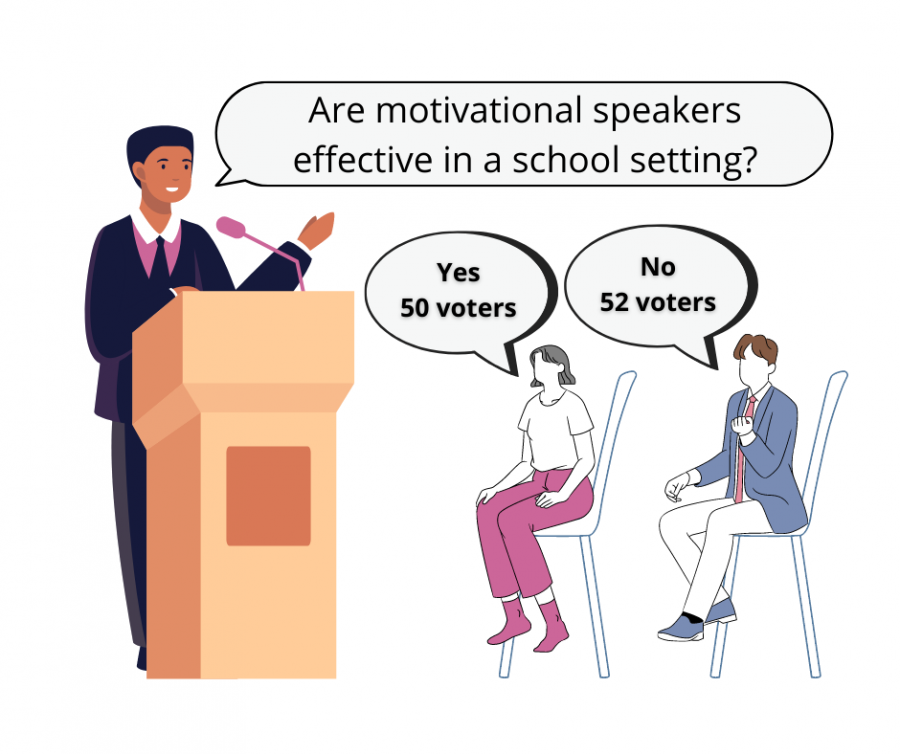Motivational speakers helpful, needs more diversity, warning
December 8, 2021
There is always a lesson to be learned. People go through their lives learning lessons that, regardless of value, have an impact on their future. These lessons can occur at any given moment and present in any shape.
For school kids, these often come up in the form of motivational speakers. People from different backgrounds come to the schools and talk to the students about various subjects, such as bullying or rough lives growing up. Serious issues tend to be the center of the speeches, with some including domestic violence and severe mental health issues.
An issue arises when there is no prior warning to the content that will be included within the speeches, as well as the overall effectiveness and necessity of the speakers.
The Mentor Editorial Board believes that while motivational speakers can be beneficial, there needs to be certain changes and additions to the speeches and not relying on the speakers alone.
Manhattan High recently had one of these motivational speakers come in. Manny Scott, one whose story was told in the 2007 movie “Freedom Writers,” came in, holding three sessions during the school day. Scott also spoke at the middle schools and has done training with the district faculty over the past year. Scott presented various statements, having students stand up if it applies to them. It started off with some light subjects: Stand up if you’re a fan of Drake, stand up if you use Snapchat, etc. After a few minutes, it suddenly turned into more serious subjects.
The speech focused on domestic violence, abuse, low income and other experiences that Scott himself has been through. There were quite a large group of students that stood for some of the more serious questions, and it came as a shock to some who witnessed it.
There wasn’t any prior warning as to what Scott would be discussing, so many students went in oblivious. Others were fortunate enough to hear from other students who went before them. Much of what Scott both talked about and reenacted were extremely sensitive and triggering subjects that should’ve had some sort of warning before the students walked in.
The students, along with not having a trigger warning, were allowed to leave the room if the content was too much. However, there were numerous teachers standing next to the exits, resulting in students feeling more uncomfortable with leaving. It needed to be easier for students to leave the room if something were to be too sensitive for them to hear or witness.
There are plenty of beneficial outcomes from a motivational speaker, such as building self-esteem and providing productive learning advice, or enhancing communication and empathy skills. It is a problem, though, when there aren’t any resources provided after the speech to act on those pieces of advice. Scott didn’t provide any outside resources for students to go to if they were experiencing any of the issues mentioned. It’s counterproductive to say “There are people who will help you,” and then not provide any of those people to go to.
Many of the motivational speakers fall into one category: a middle aged man telling us that we aren’t alone and to avoid addiction. The anti-bullying ones also fall into this specific category. If you look up “Motivation speakers,” you’re going to get mostly white, middle-aged and older men. The demographic is very limited, with very few non-white, non-male speakers. The lack of diversity also results in a barrier between the students and the speaker. Scott provided a different perspective, which strayed away from the standard “White man explains to us that bullying is bad and there are things people are going through” narrative. There were more students who could understand what he went through and may have been through or are going through the exact same issue. But a non-man motivational speaker hasn’t presented at Manhattan High any time in recent years.. There is the man’s perspective of witnessing domestic violence, but we’ve never gotten a victim’s perspective, a woman’s perspective, any non-cisgendered heterosexual man’s perspective. The smallest step our school could take would be having a non-man speaker. It can move past that, to having non-white non-man person speak, an LGBT+ speaker and so on.
With the exception of last year, the school only has one speaker per year. Advisory had something similar to the idea of motivational content, with videos of a guy explaining stress and work ethic, but that was it. Many students here don’t even remember attending the speaker the year before that.
Once a year can’t work if this is supposed to be an important experience for all of the students, something that will help them in their future.


